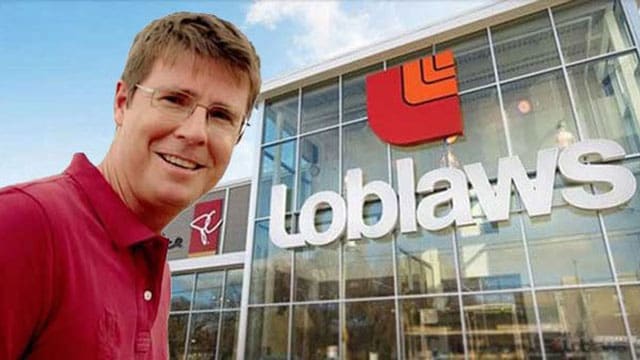Loblaw faces consumer backlash amid financial success
 It’s fair to say that Loblaw is facing some of the most intense criticism of any grocer in the country, if not North America. Reporters from around the globe are now turning to Canadian experts to better understand what has been termed the “Loblaw phenomenon.” Despite Galen Weston’s disappearance from the airwaves almost a year ago, in April 2023, animosity toward the company and him remains palpable.
It’s fair to say that Loblaw is facing some of the most intense criticism of any grocer in the country, if not North America. Reporters from around the globe are now turning to Canadian experts to better understand what has been termed the “Loblaw phenomenon.” Despite Galen Weston’s disappearance from the airwaves almost a year ago, in April 2023, animosity toward the company and him remains palpable.
Numerous websites on social media are dedicated to criticizing Canada’s leading grocer. This criticism has been ongoing for several months and shows no signs of slowing down.
Nevertheless, Loblaw’s stock price remains remarkably strong, making it one of the best-performing stocks on Bay Street. At over $150 a share, it is 30 percent higher than 12 months ago and nearly 130 percent more than five years ago. Loblaw is undeniably well-managed, boasting a highly efficient food innovation supercluster called President’s Choice.
In addition to its success in the food sector, Loblaw generates revenue from real estate, financial services, and Shoppers Drug Mart, a key component of its portfolio. Loblaw’s breadth and diversification are truly impressive. Whether or not Loblaw’s critics like to admit it, the company, the largest private employer in Canada, is thriving financially. However, from a public relations standpoint, the company is struggling.
Over the past three months, both Loblaw and Galen Weston have made several missteps. One notable incident involved Loblaw and Weston apologizing for providing inaccurate information to members of Parliament when Weston spoke about Australia’s code of conduct. His opposition to the proposed code in Canada led him to mislead parliamentarians about how the code operated in Australia.
The company also had to backtrack on its decision to end the 50 percent discount on expiring food, a move that did not sit well with Canadians. CTV News’ Hafsa Arif had to inform the public that the policy was ending across the country and that Loblaw’s discounting policy was to be aligned with the competition. Loblaw reversed its decision a few days after CTV News broke the story.
Loblaw also faced public outcry over its pharmacare deal with Manulife, which it had to end. According to health experts, the deal would have limited patients’ ability to fill prescriptions for specialty drugs at Shoppers Drug Mart and other Loblaw-owned pharmacies. This incident once again made the company appear non-transparent, as backroom deals are often perceived as being against the public interest, particularly in sensitive areas such as health care.
Most recently, CBC News’ Sophia Harris reported – not Loblaw itself – that the company was implementing new anti-theft measures that might make shoppers feel guilty. Loblaw came under fire for introducing receipt scanners in four of its southern Ontario stores as a trial initiative. Positioned at the exit of the self-checkout area, shoppers must scan their receipts to unlock the gate and leave the store, with failure to do so triggering an alarm. This measure raises legal rights concerns, as well as fire and public safety issues. The news CBC broke was another public relations disaster for Loblaw.
This transparency would allow consumers to gain insight into the company’s viewpoint. However, Loblaw’s actions suggest a lack of genuine interest in maintaining the established yet delicate moral contract it shares with the public, which hinges on trust and compassion.
In the case of the latest measure, if shoplifting is indeed an issue, Loblaw should have provided quantifiable numbers to the public to demonstrate the extent of losses incurred through shoplifting or organized crime, if applicable. This transparency would then have allowed consumers to gain insight into the company’s viewpoint. However, Loblaw’s actions suggest a lack of genuine interest in maintaining the established yet delicate moral contract it shares with the public, which hinges on trust and compassion.
What has been most troubling in recent months is the unsympathetic and corporate tone of Loblaw’s messages to the public. The approach seems to equate the relationship between shareholders and the public when it should be fundamentally different. The public deserves a friendlier, more human approach, which other grocers seem to do much better.
Of course, if someone dislikes Loblaw for any reason, they can always shop elsewhere. However, in Canada, grocers tend to copy each other, so practices from a dominant player like Loblaw often become the norm. Therefore, complaints against Loblaw are not in vain, as they can have a broader impact on the industry as a whole.
Dr. Sylvain Charlebois is senior director of the agri-food analytics lab and a professor in food distribution and policy at Dalhousie University.
For interview requests, click here.
The opinions expressed by our columnists and contributors are theirs alone and do not inherently or expressly reflect the views of our publication.
© Troy Media
Troy Media is an editorial content provider to media outlets and its own hosted community news outlets across Canada.



